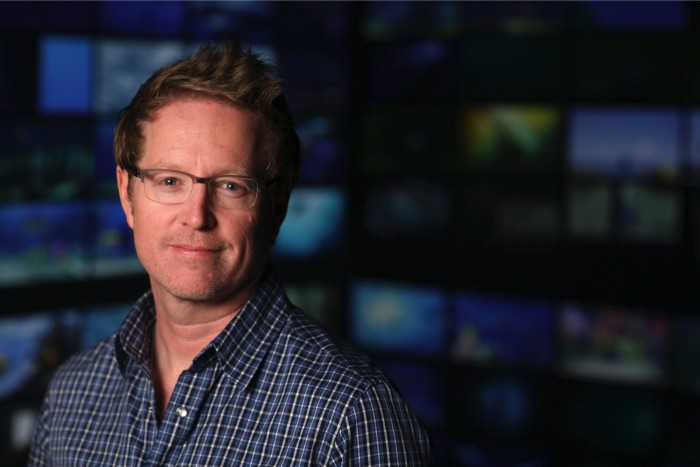Interview: 'Finding Dory' Director Andrew Stanton On Sea Lions, Sigourney Weaver, Easter Eggs And More
A couple weeks ago, I got a chance to chat with writer/director Andrew Stanton about his new Pixar film Finding Dory. The film hit theaters this past weekend and earned an estimated $136.2 million, breaking the record for the biggest animated opening of all time. (Looks like my Summer Movie Wager pick wasn't that stupid after all, although we'll have to see how it does in the second weekend to see if it really has a chance to beat Captain America: Civil War this summer.)
I decided to hold off until after release to publish the full interview as we talk about some spoilers (so stop now if you haven't seen the film). I talked with Andrew about the real and unexpected meaning behind the film's title, how he tried (or didn't try) to avoid the traps of "sequelitis," how the sea lions and Sigourney Weaver got involved, and of course that story about the symbiotic relationship between the Disney's story trust and Pixar brain trust that I shared last week. Read the full interview now, after the jump.
Interview: Finding Dory Director Andrew Stanton
I enjoyed the film.
Good!
Congratulations.
Thanks!
It's interesting that you decided to call the film Finding Dory.
Why?
Well, the main story isn't really about finding Dory so much...
It is.
Yes, but not in the traditional sense. Yes, Marlin and Nemo are in search of Dory, but thats not the main story in this film. It's about...
Dory finding herself.
So my question is, when you announced the title, was that always in the plan? Or is that something you came to in the development since?
Yes. Well, to me there's no reason to make a movie about anybody until I know there's going to be something needy about their character on the inside. So I always knew what I was going to be telling you about Marlin, even though his plotting kept changing all the time on Nemo. I always knew what I was trying to address, was this fearful nature of being a parent. And I always knew from the first movie that Dory had abandonment issues and that she had self-acceptance issues. That was what made her such an almost superhuman optimist, because it was her armor. It's what made her hope that if she was that friendly, that helpful, that joyful to be around, you wouldn't ditch her. So I always knew that that was that tragic underpinning that was under there. It's why you accept her suddenly crying 50 minutes into the picture when we haven't laid any track for it, and everybody is accepting it. They get it, because they just know that it can't be good to have short term memory loss and wonder the ocean by yourself. It can't be good. And nobody is thinking too hard to about it. They are too caught up in the moment. That's really why I got into making this film, because that issue was not resolved and it was meaty. I kill myself for years sometimes trying to get that kind of inner turmoil going on with any main character. So, yes. That was my long answer!
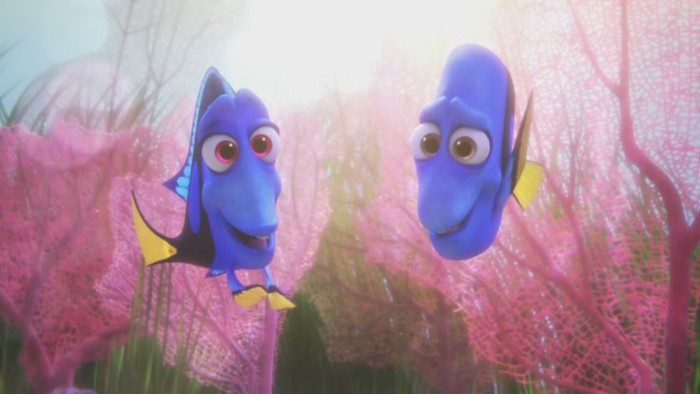 When you initially came up with the idea for this film, was it initially about her trying to find her parents?
When you initially came up with the idea for this film, was it initially about her trying to find her parents?
Yes. I always knew that I wanted her to find her parents and that I wanted her parents to be Diane Keeton and Eugene Levy. But I initially thought they would all have short-term memory loss, because that's a line she says in the first movie. She says, "It runs in my family. At least I think it does." And it led us down a wrong path for almost two years. And it's really annoying to watch three people with short-term memory loss try to deal with each other. [Laughs.] And so, I realized, "You know what? I should lean into the other part of her sentence where she says, 'At least I think it does' and have her wrong on that fact so that we just get out of this hole." It just helped get us on to the right road and led us to a bunch of other things that needed to change about the film.
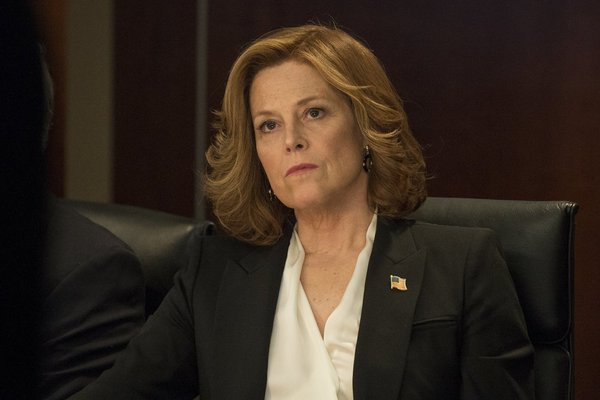 How did Sigourney Weaver come about?
How did Sigourney Weaver come about?
It was just funny to us. I mean she's the voice of The Blue Planet series if you buy the American or North American versions of that series. She's also done other nature conservations. She's big with stuff that she experienced from Gorillas in the Mist. But she's also the voice of the planetarium show at the Academy of Sciences in San Francisco. So she was the equivalent of David Attenborough to me for nature. So I thought, "Wouldn't be funny if she did the voice?" And because we know her, we thought, "This will be a nice card to pull. It'd be hilarious if she plays herself." I waited till the last minute to ask her because we were worried it'd get cut, maybe it wouldn't work in previews. So it was a scratch voice till the bitter end, and then thank goodness she said yes, because I think it's such a wining idea.
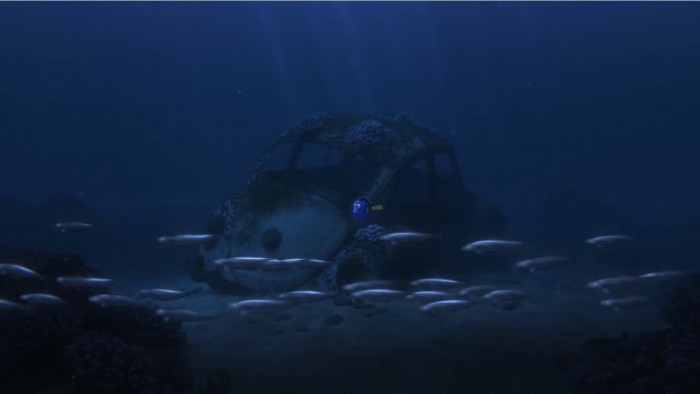 You guys are known to hide a character from the next Pixar film in the current release. I noticed there's a VW Bug in one sequence. Is that something you put into...?
You guys are known to hide a character from the next Pixar film in the current release. I noticed there's a VW Bug in one sequence. Is that something you put into...?
I wish I could say... That would be too obvious. It's not. [Laughs.]
Yeah, It was very obvious. Usually you guys...
It's just a VW Bug, sadly. But there is a Cars 3 reference somewhere else. But it's not a literal car. That's the biggest hint I'll give you. It's not a literal car in the film, our Easter egg of Cars 3.
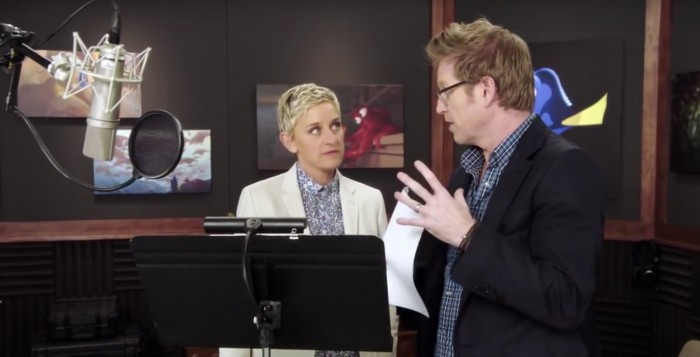 This is your first sequel as a director...
This is your first sequel as a director...
No. Toy Story 2... And Toy Story 3 and Monsters U...
Well, as a director, I mean.
As a director, yeah. But my experience in being under the hood has been since 1996.
So you have a lot of experience there.
Yes.
When you were like, "We're going to do this," what did you purposely try to avoid, the sequelitis... I feel like there are many traps.
I think the very thing that you guys spend most of your time doing, which is comparing, looking at patterns, and finding things is the enemy. I try to stay stupid and not think about any of that stuff. The reason Toy Story works is because we were too young and dumb to know what's right and what's wrong. We just had the guts to do whatever we thought hit us as OK at the time, knowing that we'll just change it until it works. So I need most of the four years that I'm writing something to be safe; safe to do every awful choice possible, to do every taboo choice. So I purposely don't want to know any of that stuff. I don't even want to look at the first film as much as I can. I want to have all my options... all my bad options on the table, because I've just historically seen that when I have that kind of freedom it eventually leads to the answer, even if I have to go through sometimes years of the wrong choice. I need that kind of safety, if that makes sense.
That makes sense.
So I don't think about that stuff, almost as a superstition.
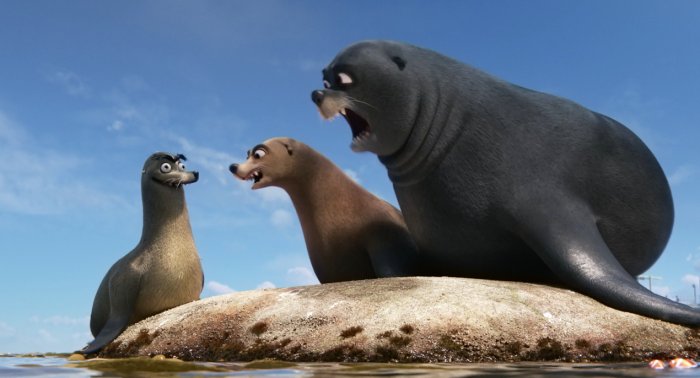 That's fair. How did the sea lions come about? They are some of my favorite new characters in this film.
That's fair. How did the sea lions come about? They are some of my favorite new characters in this film.
Fortunately, it's very much in the same vein as the seagulls. I grew up on the East Coast with seagulls everywhere. I just knew they were rats with wings. So it kind of came like being a dog owner; you just knew what a dog would be like. So having sea lions everywhere in the North Bay all the time, it was pretty instinctual for all of us that it would just be lazy and about territory. To the point that, yes, they probably would eat Marlin and Nemo if they had any desire to get off their butts, but they're not. [Laughs.]
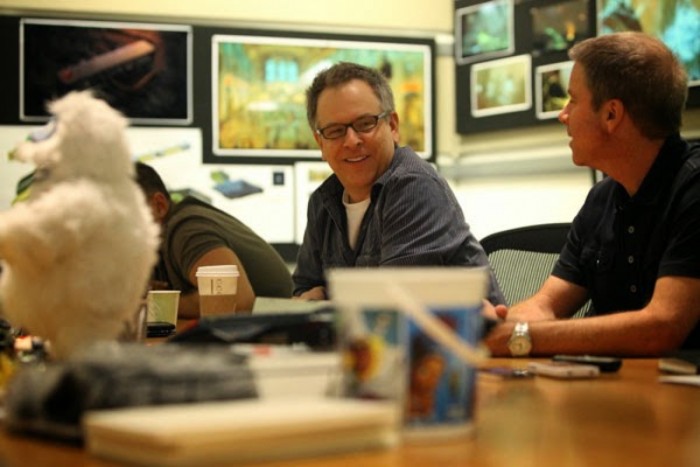 I noticed some things in the credits, particularly the Rich Moore mention in the special thanks.Rich [Moore] and Jim [Reardon] and I are classmates. We go way back. We were very close all through school and stayed very close all through our professional lives. I was trying to always woo Jim and Rich to come up and work at Pixar and they were always kinda wooing me to come to Simpsons. We've know each other forever. We're very close friends. I finally convinced Jim to come onboard to help me write WALL-E. So he worked at Pixar for a couple of years. And then Rich we finally got into Disney because he wanted to stay living south. And now the rest of the world has discovered how great of a filmmaker he always was. He was always the star of our class. And Jim was always the smartest guy in our class. I was just one of the lucky people that got to take advantage of working with them. So they've done, as friends, extra help when we wanted other eyes, because now we not only have the brain trust at Pixar, but we also show the equivalent of their story trust down at...Rich told me that they're not as smart as you guys. They're not the brain trust...
I noticed some things in the credits, particularly the Rich Moore mention in the special thanks.Rich [Moore] and Jim [Reardon] and I are classmates. We go way back. We were very close all through school and stayed very close all through our professional lives. I was trying to always woo Jim and Rich to come up and work at Pixar and they were always kinda wooing me to come to Simpsons. We've know each other forever. We're very close friends. I finally convinced Jim to come onboard to help me write WALL-E. So he worked at Pixar for a couple of years. And then Rich we finally got into Disney because he wanted to stay living south. And now the rest of the world has discovered how great of a filmmaker he always was. He was always the star of our class. And Jim was always the smartest guy in our class. I was just one of the lucky people that got to take advantage of working with them. So they've done, as friends, extra help when we wanted other eyes, because now we not only have the brain trust at Pixar, but we also show the equivalent of their story trust down at...Rich told me that they're not as smart as you guys. They're not the brain trust...
Well, they're rising very quickly. And frankly, Rich and Jim were always that smart. I just had a little bit more interaction with them as far as getting help. And I helped them a bit on Zootopia, too. So it's a very mutual...
When did they get involved in that process? Is it like animatics or is it like going through the...?
What we found is the smart thing to do, and I don't know if it's a hard, fast rule, but it just seems to be in the last couple films. We kind of wait till we think the film is working but we have one more shot at changing everything. And that's when we kind of show it to Disney, because everybody has lost all their objectivity at Pixar. So we kind of need, "How can we show this to a group that's just as smart but doesn't know anything? And we've got one more chance at the bat to just kind of expose something that was sitting in front of us that we couldn't see." They don't like that meeting and we don't like that meeting, because you want to be done. You've worked really hard. It's usually about two and a half, three years in. you don't want to know that there's still something wrong. So it's never a fun time. But it's always like, "Thank goodness they saw it."
So in the meeting for this, what comes up?
Dory's arc was still not clear. Even though we understood it finally as the filmmakers, it wasn't clear to the rest of the audience. And that's what brought forth the flashbacks. The flashbacks were a last-minute idea. They were the opposite of a problem I had on Nemo. On Nemo, for three and a half years that entire prologue of him losing his wife and family was actually doled out as flashbacks through the whole movie, and then the real tragedy was exposed at the time of the fishing net. And you never related to Marlin. Everybody always thought he was too whiny and too needy. And then the minute we put it all to the front and didn't change a line of his, everybody sympathized with him. That's what made it so daring to put such a tragedy up front, because it helped the whole movie. So to suddenly discover in an ironic way that we had the opposite problem. I had too much prologue in Finding Dory and I was telling too much. So we realized, "we need to make there be a hole in this and let Dory... let us be alone with Dory." As she gets farther, she earns memories and we get to experience that cathartic-ness with her. It gave me such a sense of peace because it was like the inverse of the other movie. But that only came out of pressure from it still wasn't working 100% when Disney watched it.
Well thank you very much. I appreciate it.
OK. Good to talk to you, man.

